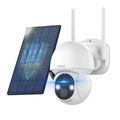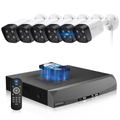Seven Main Causes of Unclear Monitoring Images
Introduction:
As a leading brand in the surveillance equipment industry, OHWOAI is committed to providing cutting-edge and reliable security solutions. One of the crucial aspects of our products is ensuring clear and high-resolution monitoring images. However, various factors can affect the clarity of surveillance footage. In this article, we will explore the seven main reasons behind unclear monitoring images and offer valuable insights on how to address these challenges effectively.
Electronic Signal Interference:
Surveillance cameras are highly integrated systems and can be susceptible to external electronic signal interference. If the monitoring image exhibits jumping or striped patterns, it may be due to camera interference. During installation, it is essential to position the cameras far away from electronic signal sources to avoid such disruptions.
Improper Focus Adjustment:
Failing to adjust the focus properly can result in unclear images. After adjusting the zoom, it is crucial to ensure that the focus is set correctly within the designated depth of field. Failure to do so might lead to suboptimal image sharpness.
Lens Contamination:
Dirty lenses directly impact the clarity and sharpness of monitoring footage, causing blurriness and haziness. To prevent this issue, our AVENIRETOKU precision lens technology experts recommend avoiding touching the lens surface with bare hands, as fingerprints can easily impair image quality. If the lens does get dirty, use specialized lens-cleaning tissue and avoid alcohol-based cleaning solutions, as they may damage the lens coating.
Incorrect Electronic Shutter or White Balance Settings:
Cameras are usually factory-calibrated with default settings that offer optimal performance. It is advisable to maintain these default settings during installation unless specific adjustments are necessary for unique requirements.
Rear Focal Point Adjustment:
The rear focal point, also known as back focus or flange focal distance, refers to the distance from the rear surface of the last lens element to the focal plane. If the image remains unclear even after adjusting the focus to its best position or focusing at the telephoto end and zooming out to the wide-angle end, there might be an issue with the rear focal point. Some cameras or lenses have rear focal point adjustment mechanisms, while others require professional repair, adding an adapter ring, or replacing the product.
Insufficient Pixel Resolution:
High-performance surveillance relies on the perfect combination of camera body and lens, with consistent resolution being paramount. If a standard-definition analog camera is paired with a high-definition lens, the resulting image will still be of low quality. Conversely, pairing a high-definition camera with an ordinary lens will fail to exploit the camera's full potential.
Using High-Quality Lenses to Reduce Maintenance Costs:
In security applications, front-end devices are susceptible to environmental factors such as moisture, vibration, and temperature fluctuations, which can lead to focus shifts, image blurriness, instability, and faster aging. Therefore, when designing projects, it is essential to consider the system's maintenance costs.
Conclusion:
At OHWOAI, we understand the importance of clear and high-resolution monitoring images for effective security solutions. By addressing the seven main causes of unclear monitoring images mentioned above, we ensure that our surveillance camera systems provide reliable and superior performance, ensuring the safety and security of businesses and residential areas. With our commitment to innovation and customer satisfaction, OHWOAI continues to be the brand of choice for cutting-edge surveillance solutions.
As a leading brand in the surveillance equipment industry, OHWOAI is committed to providing cutting-edge and reliable security solutions. One of the crucial aspects of our products is ensuring clear and high-resolution monitoring images. However, various factors can affect the clarity of surveillance footage. In this article, we will explore the seven main reasons behind unclear monitoring images and offer valuable insights on how to address these challenges effectively.
Electronic Signal Interference:
Surveillance cameras are highly integrated systems and can be susceptible to external electronic signal interference. If the monitoring image exhibits jumping or striped patterns, it may be due to camera interference. During installation, it is essential to position the cameras far away from electronic signal sources to avoid such disruptions.
Improper Focus Adjustment:
Failing to adjust the focus properly can result in unclear images. After adjusting the zoom, it is crucial to ensure that the focus is set correctly within the designated depth of field. Failure to do so might lead to suboptimal image sharpness.
Lens Contamination:
Dirty lenses directly impact the clarity and sharpness of monitoring footage, causing blurriness and haziness. To prevent this issue, our AVENIRETOKU precision lens technology experts recommend avoiding touching the lens surface with bare hands, as fingerprints can easily impair image quality. If the lens does get dirty, use specialized lens-cleaning tissue and avoid alcohol-based cleaning solutions, as they may damage the lens coating.
Incorrect Electronic Shutter or White Balance Settings:
Cameras are usually factory-calibrated with default settings that offer optimal performance. It is advisable to maintain these default settings during installation unless specific adjustments are necessary for unique requirements.
Rear Focal Point Adjustment:
The rear focal point, also known as back focus or flange focal distance, refers to the distance from the rear surface of the last lens element to the focal plane. If the image remains unclear even after adjusting the focus to its best position or focusing at the telephoto end and zooming out to the wide-angle end, there might be an issue with the rear focal point. Some cameras or lenses have rear focal point adjustment mechanisms, while others require professional repair, adding an adapter ring, or replacing the product.
Insufficient Pixel Resolution:
High-performance surveillance relies on the perfect combination of camera body and lens, with consistent resolution being paramount. If a standard-definition analog camera is paired with a high-definition lens, the resulting image will still be of low quality. Conversely, pairing a high-definition camera with an ordinary lens will fail to exploit the camera's full potential.
Using High-Quality Lenses to Reduce Maintenance Costs:
In security applications, front-end devices are susceptible to environmental factors such as moisture, vibration, and temperature fluctuations, which can lead to focus shifts, image blurriness, instability, and faster aging. Therefore, when designing projects, it is essential to consider the system's maintenance costs.
Conclusion:
At OHWOAI, we understand the importance of clear and high-resolution monitoring images for effective security solutions. By addressing the seven main causes of unclear monitoring images mentioned above, we ensure that our surveillance camera systems provide reliable and superior performance, ensuring the safety and security of businesses and residential areas. With our commitment to innovation and customer satisfaction, OHWOAI continues to be the brand of choice for cutting-edge surveillance solutions.
Sample Block Quote
Nam tempus turpis at metus scelerisque placerat nulla deumantos sollicitudin delos felis. Pellentesque diam dolor an elementum et lobortis at mollis ut risus. Curabitur semper sagittis mino de condimentum.
Sample Paragraph Text
Lorem ipsum dolor sit amet, consectetur adipiscing elit. Morbi ut blandit risus. Donec mollis nec tellus et rutrum. Orci varius natoque de penatibus et magnis dis parturient montes, nascetur ridiculus mus. Ut consequat quam a purus faucibus scelerisque. Mauris ac dui ante. Pellentesque congue porttitor tempus. Donec sodales dapibus urna sed dictum.










